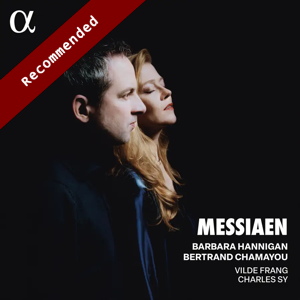
Olivier Messiaen (1913-1992)
Song Cycles
Chants de Terre et de Ciel (1938)
Poèmes pour Mi (1936)
La Mort du Nombre (1930)
Barbara Hannigan (soprano), Bertrand Chamayou (piano), Charles Sy (tenor), Vilde Frang (violin)
rec. 2021/2022, Muziekcentrum van de Omroep, Hilversum, The Netherlands
Alpha Classics 1033 [59]
Messiaen wrote four song cycles for soprano voice and piano and one short cantata for two singers, violin and piano. The first of these, Trois mélodies of 1930, is early and not characteristic. The next two, Poèmes pour Mi and Chants de Terre and de Ciel are included here, as is the short cantata La Mort du Nombre. Messiaen later orchestrated Poèmes pour Mi but here we have the original version for voice and piano. They are performed in reverse chronological order, as listed.
These two song cycles were both inspired by the composer’s marriage to the violinist and composer Claire Delbos in 1932. Mi was Messiaen’s pet name for her. Poèmes pour Mi celebrates their marriage and Chants de Terre et de Ciel the birth of their son Pascal. Sadly, in 1949 an operation went wrong, and Claire suffered total amnesia. She had to be moved to a care home, where Messiaen visited her regularly. She died in 1959.
These two song cycles recall happier days. They are both written to his own poems. These have no great merit as literary works but are adequate as texts for setting to music. Messiaen was a profoundly religious man and both cycles link his present happiness with the symbolism of his faith. His view of marriage is traditional, but not sentimental. Poèmes put Mi is a set of nine songs, divided into two books. The first book deals with preparation for marriage, the second with its realization. In the first book are Thanksgiving, Landscape, The house and Terror. The first three are straightforward. Terror links the fear of losing love with that of hell. The second book has The wife, Your voice, The two warriors – who are the married couple, The necklace and A prayer fulfilled. Chants de Terre et de Ciel continues the story with six songs, A pact with Mi, Antiphon of silence for the feast of guardian angels, Dance of my Baby Pilule (for my little Pascal, Rainbow of innocence (for my little Pascal), Midnight heads or tails – about caring for the baby in the middle of the night, and Resurrection (for Easter Day).
Although in the vocal line you can still hear some echoes of Debussy and even of Tristan, the piano writing is characteristic early Messiaen, like that in the piano Préludes of 1929. Messiaen used to play the piano part himself, so it lacks the greater virtuosity of the works he wrote later for Yvonne Loriod. The vocal part was written for a dramatic soprano, Marcelle Bunlet at the first performance. However, the writing demands considerable flexibility and occasionally goes down to a very low dynamic level, for both of which a lighter voice is more appropriate. Barbara Hannigan, with her long experience of singing demanding twentieth century works, seems to me very well suited to these songs. She has clearly given a great deal of time to their preparation, as she writes in the booklet note. Bertrand Chamayou has a good track record as a Messiaen pianist, with a widely praised recording of Vingt Regards to his credit (review). He has a wonderfully sensitive touch and supports the voice well while clarifying the often intricate detail of the piano part.
The short cantata La Mort du Nombre is a filler. This is for soprano, tenor, violin and piano and sets a poem by the composer which dramatizes a dialogue between two souls, one dying and despairing, the other full of hope. It sounds rather like Ravel. Here Hannigan and Chamayou are joined by the tenor Charles Sy and the violinist Vilde Frang and they offer a polished performance of this little work. The recording is fine.
These works have had several other recordings, though they are mostly now only available as downloads. However, I am happy to omit comparisons and can strongly recommend this. I hope Hannigan and Chamayou go on to record Messiaen’s later song cycle Harawi.
Stephen Barber
Buying this recording via a link below generates revenue for MWI, which helps the site remain free.




















